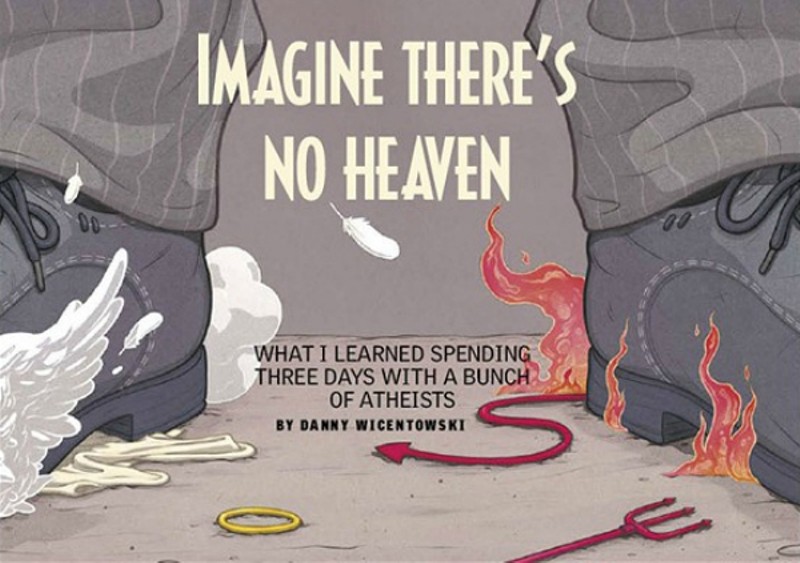I was seventeen when my yeshiva class assembled for "the talk." We shuffled through the school's dining hall and into an adjoining common area, and there stood a bearded, middle-aged rabbi in a rumpled white dress shirt and black suit. Over the course of two hours, he conclusively proved the divine origin of the Torah. He ripped fatal holes through Christianity and Islam's claims to authenticity. He name-dropped Seinfeld creator Larry David and other Hollywood friends.
At the end of the speech, the rabbi clutched his black velvet yarmulke above his head and bellowed that he would rather leave Judaism than follow its customs out of habit or some shallow sense of comfort.
"If you don't want to be here," he said, firmly replacing the yarmulke atop his salt-and-pepper hair, "then just leave!"
Eight years later the memory bubbles through my mind as I hasten across Washington University's campus. Classes are out for the summer, meaning the place is deserted save for a wedding party, some cricket players and, for the next three days, several hundred atheists. That's why I'm here.
I find the sign-in desk for the Gateway to Reason conference through the entrance of the Laboratory Science Building. I'm immediately waved aside by a local member of the Satanic Temple. She whispers that none other than Doug Mesner — a.k.a. "Lucien Greaves," the Satantic Temple's enigmatic founder and spokesman — will be arriving on Sunday to address the conference.
It's a marquee addition for the Gateway to Reason: This year, the Temple courted Christian hand-wringing and news coverage by suing the state of Missouri over its restrictive abortion laws. In the still-pending lawsuits, its attorneys argued that mandated waiting periods and other onerous requirements on women seeking abortions infringe on its members' religious beliefs. And even though the Satanic Temple's tenets are fundamentally opposed to all forms of supernaturalism (including the idea of worshiping a literal Satan), its supporters profess deep and genuine beliefs about bodily autonomy and a woman's right to choose. The high-profile effort has turned the group into atheist superstars.
Even beyond the buzzworthy presence of Satanists, the conference's chief organizer, a professional pet photographer named Thomas True, has already assured me that the conference is a big deal for St. Louis.
"I travel to about ten different cities in Missouri and Illinois, I'm constantly finding and meeting atheists and freethinkers." True told me over the phone in May. "I've been trying to get something like this going for years."
According to True, Gateway to Reason, held July 31 to August 2, would be the first event of its kind in St. Louis.
"A lot of larger conventions are on the east and west coasts, or they migrate to places on the edges, like Austin," he said. "St. Louis is convenient to get to, and a convention like this has never been held in a metro area like this."
To bolster his point, he cited a 2014 survey from the Pew Research Center that found 23 percent of the U.S. population doesn't identify with a religion.
"That group should actually exceed even the evangelicals within the next presidential election," he said excitedly. "We are right in line."
I'm already late for the convention's first event, a documentary screening, and so instead I decide to wander a bit. I spot a booth hawking what initially looks like a children's picture book, titled Bedtime Bible Stories. I find myself staring at a lushly colored illustration of a blood-covered Grecian solider, a baby slung over his shoulder by its umbilical cord. At the soldier's feet are a coil of intestines and a woman with a slashed abdomen. In classic cartoon fashion, X's are drawn where her eyes should be.
"See, if you're reading your Bible, it's Hosea chapter 13, verse 16, where God literally commands soldiers to kill pregnant women and rip babies from their womb," says Joey Kirkman, the book's author. A former evangelical Christian, he explains that Bedtime Bible Stories is intended to strip away the romanticism of Old and New Testament stories. It's also intended to be funny.
"I'm not really making fun of a dead baby being ripped out of a mother; I'm making fun of a fictional book," Kirkman continues. To sell books, he tours conventions like this one — nearly twenty so far, by his count, in the past two years.
Kirkman pulls out a copy of Bedtime Bible Stories and flips a few pages. Now we're looking at a drawing of Noah standing before his ark as floodwaters rise around him. A pregnant woman with a baby tied to her back reaches toward Noah, begging for a spot on the ark.
In school, I was taught that the story of Noah's flood was a literal account, a real-life chronicle of the monumental stakes underpinning our own existence. Ultimately, various rabbis and teachers instructed, it was a story of God's boundless capacity for renewal and love.
I stopped wearing the yarmulke more than two years ago, and although I can see what Kirkman is getting at, the pictures don't feel funny to me. His pitch makes me uncomfortable; it feels like I'm being asked to laugh at my previous self for being so dumb, so gullibly bloodthirsty. (On a pettier level, I've read enough of the Bible to know Kirkman misinterpreted the passage in Hosea. God wasn't "literally" commanding soldiers to kill babies. Rather, it is the prophet Hosea foretelling the ruin to befall the Jews if they fail to repent. Maybe that's a small distinction, but more than a decade of Bible study makes me a stickler for textual context.)
"The only thing that explains it is childhood indoctrination," Kirkman tells me. "If someone walked up to you at age twenty and said, 'Hey, this is what my God does, and this is loving,' you would say, 'This is batshit crazy!'"
Kirkman points back to Noah and his drowning cartoon world. "According to the Bible, this is what happened," he says. "Pregnant women died. Their children died. If God said to bring only two of everything, lots of animals died."
He's right, of course, but there's something else gnawing at me. This convention is designed to appeal to people just like me, the heretics, the disappointers of forefathers, the forsakers of tradition. But if atheism could wash away belief like Noah's flood, I wonder, what would be left? What would be built in its place? Would it be good?






